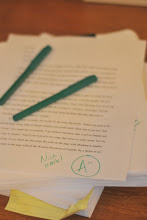I'm working on my dissertation today. I came across the following tidbit, which captures much of what F. Scott and I have been chatting about in terms of how we've been asking our students lately to discuss literature in class. So here it is:
In Why Read?, Mark Edmundson (2004) calls for a reconsideration of how literature is typically dealt with in the college English classroom. He insists that teachers work away from more traditional classroom (New Criticism-esque) approaches toward a more meaningful approach to literature--asking students, for instance, what it would be like to take on a piece of literature as one's guide to life. What would it mean to live life by the guidelines suggested in this text? He argues that "literature [...] is the major cultural source of vital options for those who find that their lives fall short of their highest hopes," that "in literature there abide major hopes for human renovation" (p. 3). Probst (2004) echoes this. He explains that reading is not about searching for "'the meaning' of the work, a meaning residing in the text, as in the New Critical approaches," but rather an opportunity for exploration and creation (p. 3). He says that teachers should not ask "What does the work mean?" but rather "What can we do with the work?"--a similar question to Edmundson's about what it would be like to live life via the guidelines suggested in a particular piece of literature. In doing this, Probst reminds us, that our middle and high school students are not the intellecutal elite that end up as graduate students of literature; they are a "representative group from the local community," and therefore it's important to honor and make room for the individual exchanges between reader and text (p. 34). They are not literary scholars, but they can still access the "resevoir of all human concerns" that Probst sees in literature if we create the right kind of classroom space for them to do so.
In Why Reading Literature in School Still Matters: Imagination, Interpretation, Insight, Sumara (2002) makes a similar argument, that teachers need to work toward making literature matter more to our students. He claims that overall, literature "creates the possibility for deep insight," that engaging with literature "can facilitate the creation of interesting sites for thinking," that these literary engagements can "expand [students'] imagined world of possibilities," and that because in life "understanding requires interpretation, and interpretation requires practice," literature study can provide important opportunities for students to learn these skills (pp. xiii-xiv). Ultimately, Sumara believes that literature captures the "unnoticed experiences that combine to make a life" (pp. 154-5).
But Sumara--through his perspective as a former public school teacher--sees problems with literature instruction in schools. He is worried that the public schools "are not very interested in helping young people develop" important interpretation practices for literature (p. 157). He sees this in how students are often forced to read a lot of literature quickly, looking only for literary devices in order to write critical essays (p. 157). This, he thinks, is why students often claim that literature doesn't matter much to them, rather than seeing it as an integral piece of understanding the human experience (p. 157). Instead, literature will matter in schools if teachers put aside "theories of learning that insist on excavating Truth" but instead create "conditions for people to learn to be surprised by what might happen if they dedicated themselves to literary practices that require a sustained engagement with someone else's structure of thinking" (p.160).
(end of dissertation tidbit)
Now, as to why it's so difficult to actually get schools to teach literature in this way --> if I have time today, I'll write about the dominate teaching paradigm that controls the way we ALL think about school.
M. Shelley
----------------------------
Edumundson, M. (2004) Why Read? New York: Bloomsbury.
Probst, R.E. (2004) Response and Analysis: Teaching Literature in Secondary School (Second Edition). Portsmouth, New Hampshire: Heinemann.
Sumara, D. J. (2002) Why Reading Literature in School Still Matters: Imagination, Interpretaiton, Insight. Mahweh, New Jersey: Lawrence Erlbaum Associates.
ICE Executes Another Citizen in Minneapolis
3 days ago


No comments:
Post a Comment